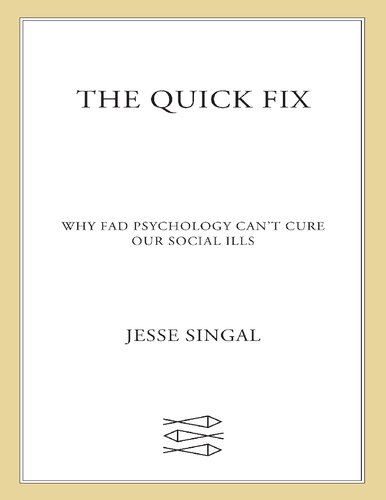
The Quick Fix
Why Fad Psychology Can't Cure Our Social Ills
- اطلاعات
- نقد و بررسی
- دیدگاه کاربران
نقد و بررسی

December 21, 2020
Journalist Singal takes aim at “half-baked behavioral science” in his impassioned yet disappointing debut. Drawing on his experiences as the former editor of New York magazine’s “Science of Us” column, Singal critiques the research behind topics including criminal superpredators, the links between assertiveness and posture (i.e., “power poses”), and how boosting students’ “grit” can improve their classroom performance. He delves into the problematic research techniques that can sometimes make “mere statistical noise... look like a pattern,” and castigates scientists, popular media, and academic journals for focusing on improvements individuals can make rather than the structural reforms he believes society needs (“The reforms that ask the least of us are often the ones most apt to go viral”). Though Singal accurately identifies many problems with “fad psychology,” most of the topics he addresses have already been widely debunked, and his analyses of where the science goes wrong are often too convoluted for the lay reader to follow. This well-intentioned takedown comes up short.

February 15, 2021
A journalist questions the shoddy research and pseudoscientific claims of "popular behavioral science." With their promises of improving individuals' lives, recent thought leaders hyping quick-fix behavioral science concepts have gained undeserved recognition. Even though their findings are misleading, writes New York magazine contributing writer Singal, they are still "frequently being adopted by schools, corporations, and nonprofits eager to embrace the Next Big Thing to come out of the labs and lecture halls of Harvard or the University of Pennsylvania." Sadly, "this replication crisis has cast a giant shadow over the entire field of psychology." In his debut book, the author explores a variety of relevant topics: the positive thinking and self-esteem craze that took root with The Power of Positive Thinking, I'm OK--You're OK, and other similar books, which explored "the principle that people have deep psychic wounds that need to be addressed before they can fully actualize themselves"; Princeton political scientist John DiIulio's faulty theory of "superpredators," which suggested that certain juvenile criminals (most often young Black teens) are impulsively and remorselessly willing to commit violent crimes; what body language and posture can reveal about assertiveness and how "power posing" can elevate external and internal signals of confidence. Though Singal's broad-reaching expos� is well documented, the less-than-compelling narrative fails to convey the significance of the issues. The author builds his often pedantic arguments on long stretches of accumulated research findings, citing seemingly every applicable study (more rigorous editing would have helped). Singal rightly points out the virtues of Anand Giridharadas' Winners Take All (2018). However, whereas that book was a masterful takedown of the philanthropic elite that showcased the author's sharp storytelling skills, this book lacks a similarly engaging voice. The result is a well-researched but long-winded exercise. An insightful yet plodding critique of faddish trends.
COPYRIGHT(2021) Kirkus Reviews, ALL RIGHTS RESERVED.

March 26, 2021
In order to explain the allure of fad psychology, Singal, former editor of New York magazine's "Science of Us" column, presents this well-researched book that explains how half-baked behavioral science spreads. He claims there are many reasons such ideas catch on, one of which is the way these ideas seem like easy fixes to complex issues. Examples he debunks include a study that showed that soldiers can resist PTSD if their resilience is boosted and another that said helping students develop grit can improve classroom performance. He also examines the self-help industry and how it has spurred a litany of TED Talks and psychological trends. Singal argues that when he scrutinized many claims, he uncovered botched research and hazy statistical interpretations. Readers can approach this book a chapter at a time, and overall, they will see Singal's big picture of how ideas about self-esteem, bias tests, positive psychology, and other fads put limitations on everyone's ability to dig deeper into these matters. This book will appeal to readers who want to understand the complexity of psychological issues.
COPYRIGHT(2021) Booklist, ALL RIGHTS RESERVED.




دیدگاه کاربران